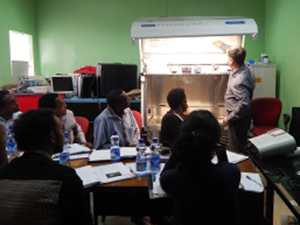National Public Health Institutes Program: About Us
What We Do: Create Sustainable Homes for Public Health Expertise
National public health institutes (NPHIs) help many countries around the world carry out essential public health functions and ensure accountability for public health resources. Globally, NPHIs serve as homes for countries’ public health systems and expertise.
The U.S. national public health institute is CDC in Atlanta, but many other countries have – or are developing – their own institutes. Building on more than 70 years of experience, the Centers for Disease Control and Prevention help countries around the world develop and strengthen their own organized, well-functioning NPHIs to protect the public’s health and contain disease close to the source.
Why It’s Important

With support from the NPHI program, staff from the Ethiopian Public Health Institute learn how to test in-flow and down-flow on the biosafety cabinets.
Public health systems function better when there is a single focal point. When public health activities are fragmented, with responsibility spread across multiple entities, it can lead to:
- Inefficiency due to duplicated efforts or wasted resources
- Lack of leadership and accountability
- Slower response times
- Reduced impact of the programs that are intended to help people
NPHIs address these issues through consolidating public health functions at the national level, bringing together data and expertise while coordinating efforts across sectors.
By offering guidance and support to countries who are developing or strengthening their own NPHIs, CDC helps countries become better equipped to collect and use public health data; plan, implement, and monitor public health programs; and, ultimately, save money and protect lives—both overseas and at home in the United States.
How We Do It
Essential public health functions can be done by more than one institution in a country, and may include:
- Disease surveillance
- Emergency preparedness and outbreak response
- Disease-specific control programs
- Public health workforce development
- Occupational and environmental health
- Public health research
CDC’s NPHI program emphasizes high impact, transformative investments. We draw on existing partnerships and scientific expertise within countries in order to promote self-reliance. When countries request CDC’s assistance, we engage with ministry of health officials and national partners to help countries:
- Develop a strategic plan aligned with public health priorities
- Determine any necessary policy changes
- Create a sustainability plan
- Provide technical expertise (which may include linking with other established institutes or U.S. state health departments)
CDC’s role in NPHI development is to provide technical expertise on essential public health functions and is targeted to a country’s public health priorities. In addition, CDC’s engagement may focus on sub-national public health entities that make up a country’s public health system.
Where We Work
One size does not fit all. Institutes vary in size, scope and availability of resources, and CDC’s role varies based on the context in which we are working. Learn more about where we work.
Our Organization
In addition to Ministries of Health and host country governments, CDC partners with the International Association of National Public Health Institutes (IANPHI) on development and strengthening activities. Learn more about our partners.
Fast Facts
- Core functions of NPHIs include: Population health assessment, surveillance and response, research, health education/health promotion, and public health workforce development.
- The CDC NPHI program has worked with over 20 countries and 1 entity on NPHI creation or enhancement since 2011.
- We partner with centers and units all over CDC to draw upon subject matter experts in the areas most important to partner countries.
- We work closely with the International Association of National Public Health Institutes (IANPHI), who maintains a membership of more than 100 NPHIs in nearly 100 countries, reaching more than 6 billion people worldwide.
- Page last reviewed: June 8, 2017
- Page last updated: June 8, 2017
- Content source:


 ShareCompartir
ShareCompartir